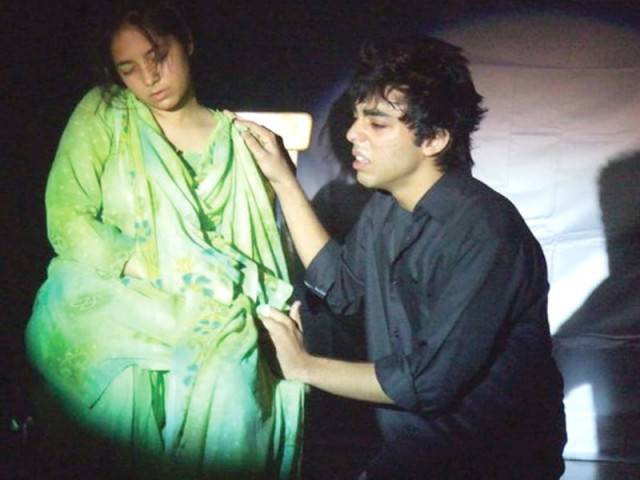The First Act: Unplugged and unmatched
Cogito, an acting troupe, presented three plays at The Second Floor.

The First Act: Unplugged and unmatched
While some production houses are pulling off fantastic shows of epic proportions, The Second Floor (T2F) brought forth a few raw, intimate and interactive performances on Wednesday, June 8. Orchestrated by Cogito, a group of actors from various universities in Pakistan, The First Act promoted gripping theatrical performances through intense audience interaction.
With minimal use of technological distractions, the success of the entire event rested heavily on the actors’ shoulders. “The idea behind the acts was to showcase our talent,” explained actor and director Shehzad Ghias.
The event was short and sweet. The quality of acting left the audience enthralled. “I wish it would have gone on longer,” murmured Adil, a spectator, shortly after the first play ended. The first two plays were no longer than 15 minutes and the final performance lasted just short of an hour.
Maa
The first play of the evening was Maa. It was written by Umar Farooqi, who was also one of the central actors of the play. It highlighted a complex relationship between a young boy and his mother. A few simple scenes showed the ignored mother who had high expectations from her only son, going through a personality change after the death of her husband. The role of the widowed mother was played beautifully by a second year student from Lahore University of Management Sciences (Lums), Amtul Baweja. The play ended with Farooqi arriving late to wish his mother on her birthday, only to find out that she had passed away. “When my mother needed me most, I wasn’t there for her,” cried out Farooqi’s character. The audience was left considerably touched after this performance. So much so that one audience member was overheard whispering, “I love you Ammi,” on her phone. Maa won many awards at Lums including, best play, best director, best actor and best supporting actor.
Khalla
After a fifteen-minute break, the second play started. Khalla was both performed and written by Shehzad Ghias, who played the role of Raees Iqbal. It was a one-man act that displayed a journey into the mind of a schizophrenic and highlighted how society deemed mentally unstable people to be unfit and unequal “Who are you, why are you here, what do you want,” screamed Ghias at the audience. The gist of the play was that the lack of knowledge about mental illnesses was far more dangerous than the illness itself.
Barri
The third and final play of the night was Barri, an adaptation of a play written by Shahid Nadeem. It aimed to highlight the result of oppressive laws that were brought into functionality during Ziaul Haq’s Islamic regime in 1983. It is the story of four women who come together in a Pakistani jail cell. “Zahida Zaman is a forward thinking member of a womens’ rights organisation who believes in changing the world by upholding law and order. Her human rights rhetoric is confronted by the real life stories of Jamila, Jannat Bibi and Mariam,” explained Ghias. The harsh treatment of women in Pakistani prisons was the topic under scrutiny in this play. Lawyer-turned-prisoner Zahida Zaman, played by Rabab Samo, narrates the story of her fellow inmates and their real-life nightmare. An old woman named Jannat Bibi, played by Amtul Baweja, was suffering in prison for crimes her son was responsible for. Jamila, played by Mariya Dada, was a victim of domestic abuse who had murdered her husband. The third inmate, Mariam, played by Palwasha Yahya, was a psychologically unstable female beggar who was arrested for dancing in public, since it is considered illegal under Shariah law. Her pregnancy, as a result of a rape in the prison, represented the distress and helplessness that women undergo in prison. Upon being asked who the father was, she replied, “It could be the superintendent or the doctor or the warden,” ticking off a non-exhaustive list.
The audience was left mesmerised after the final performance. “I thought it was brilliant and created awareness about the social struggle in Pakistan,” said Mehmood, an enthusiastic theatergoer. “The acting was breathtaking and I couldn’t look away for even a second during the performances,” he concluded.
Published in The Express Tribune, June 10th, 2011.


















COMMENTS
Comments are moderated and generally will be posted if they are on-topic and not abusive.
For more information, please see our Comments FAQ